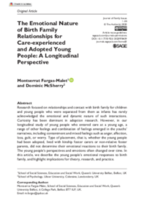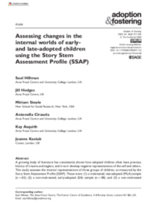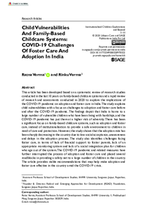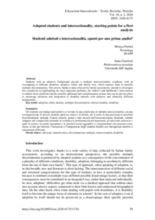Displaying 91 - 100 of 660
In this article, the authors describe young people’s emotional responses to birth family, and highlight implications for theory, research, and practice.
The Critical On-going Resource Family Education (CORE) Teen is a comprehensive foster parent training program designed to provide resource parents with the knowledge and skills to support teens in their care. This study examined results from trainings conducted across four states and one tribal nation in the U.S.
This study assesses the internal representations of three groups of children, as measured by the Story Stem Assessment Profile (SSAP). These were: (1) a maltreated, late-adopted (MLA); (2) a non-maltreated, early-adopted (EA) sample; and (3) a non-maltreated community sample (COMM).
This Chapter elucidates the objectives, scope, and challenges in the implementation of the 1993 Intercountry Adoption Convention.
This study examined the recurrent maltreatment of American Indian children in foster and adoptive homes, specifically the physical, emotional, sexual, and spiritual abuse subtypes, as well as poly-victimization of American Indian children in comparison to their White peers.
This article has been developed based on a systematic review of research studies conducted in the last 10 years on family-based childcare systems and a rapid review of research and assessments conducted in 2020 to explore the implications of the COVID-19 pandemic on adoption and foster care in India.
This study explored data obtained from surveys of caregivers who had previously adopted or assumed guardianship of a child from foster care in two U.S. states. Descriptive analyses summarized the demographic and wellbeing characteristics of children and families, and multivariate regression models estimated the association between these variables and caregiver commitment.
This article, thanks to data collected by family associations, intends to investigate multiple intersectionality of students with adoptive background by highlighting the most important problems, the school’s and healthcare’s interventions to address those problems and the possible additional and complementary actions that can be put into place to encourage inclusion and integration of disabled students with adoptive and ethnically different backgrounds.
This article studies how three groups of professional decision-makers – child welfare workers, experts on children and judges – exercise discretion in decisions on adoption from care in the Norwegian child welfare system.
The purpose of this study was to investigate sub-groups of adversity in a sample of adopted children in the UK and examine the association with later post-traumatic stress (PTS) symptoms.




